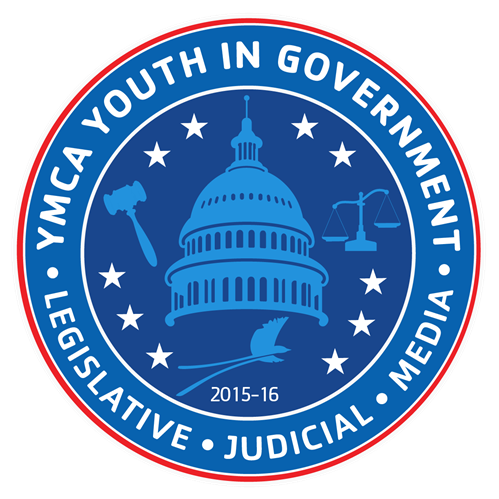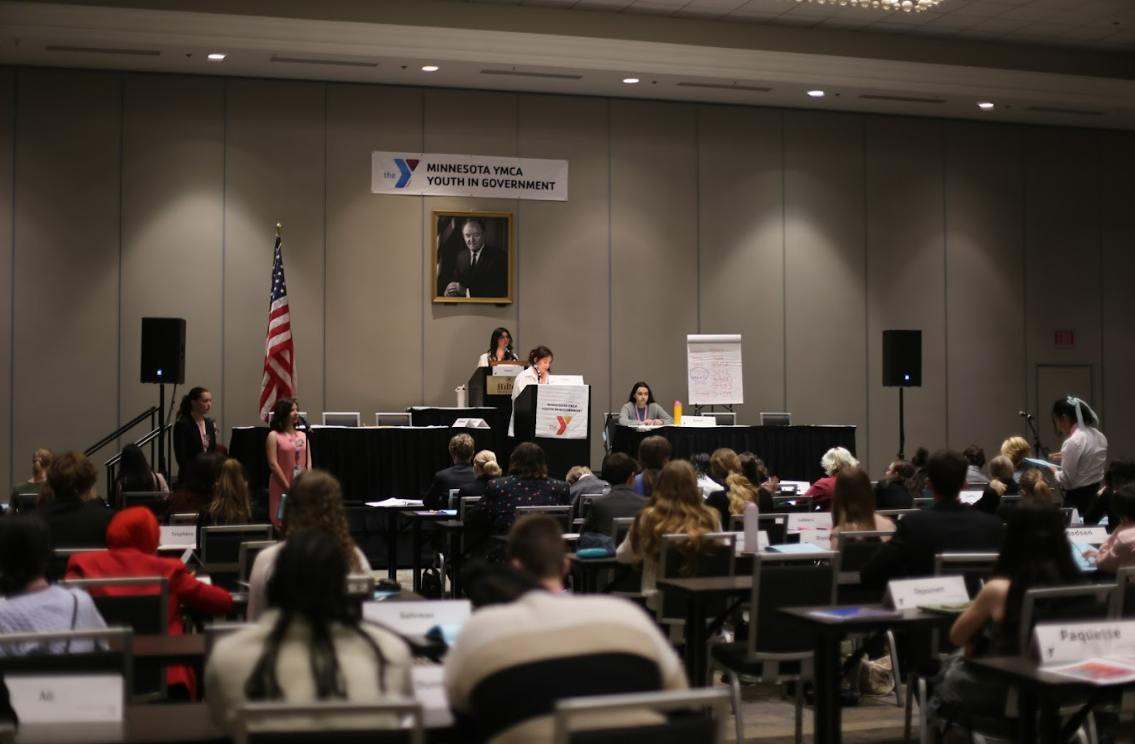Bill 1107: Arming Teachers
Story by Evelyn Pfleger, Northfield; Edited by Lale Akkin, Mounds View
Max Beckmann from the Northfield delegation wrote a bill to permit school staff to carry firearms in public schools. Although this bill was focused on increasing school safety, many were skeptical about the effectiveness.
Hayden Nichols from the Holy Family delegation lobbied in favor of this bill, but said that it was not something she supports personally. Another delegate, Hannah Stegemann from the Orono delegation, was willing to share her thoughts. “My first opinion when I heard the bill is I was kind of a little bit concerned about teachers being able to carry firearms in school, especially because the bill doesn’t specify which type of firearms they’d be able to carry and the amount of training they would do,” Stegemann said.
One of the biggest worries people had about this bill was that there are so many ways this could backfire, and that it is not necessary since a lot of schools already have security officers. The author said that he did not necessarily believe in his bill either. “YIG is about debating, and learning things of that nature, and learning how to argue things that you don’t always believe in, and that was that bill for me,” said Beckman. His bill did not pass committee, but Beckman shows other delegates that even if they do not agree with what they are arguing for, sometimes they just need to accept a challenge.
Bill 5300: Legalizing Prostitution
Story by Ethan Paul, Wayzata; Edited by Lale Akkin, Mounds View
Ram Arora from the Wayzata delegation penned a bill to legalize prostitution. Many would agree that this is quite a controversial topic, with numerous factors coming into play. For many, it is hard to come to a conclusion on the morality of this bill.
Some delegates disagree with this bill because of the morals surrounding it, along with the safety of people in the profession. “Legalizing prostitution is not a proper solution for society, it is morally wrong and could encourage more women going into this profession,” said Siddharth Chakravarthula, Wayzata delegation, strongly disagreeing with legalization because, not only does he disagree with the morals of it, but also the safety.
Others believe that the government should not interfere with these matters. “People have the right to make their own decisions, their body, their choice,” said Sufyan Nazir from the Higher Ground delegation. “It is important that they are screened for drug tests because that area of work has been known to be heavily associated with drug usage, so to make it legal, there should be some more measures to make it safer, but the principle of it should be allowed.”
With these different perspectives, it seems this is going to be a complicated bill due to the strong sides of it. The bill passed the Sanford House on Jan. 11 after heavy debate, but its journey is not over. It will need to get through the Knutson Senate and then be signed by the youth governor. “We’re leaning towards a ‘no’ but we are still open to consideration,” said Youth Governor Taras Sarazyhynskyy from the Wayzata delegation.
Bill 5411: Working from Roots to Solve Homelessness
Story by Simon Forbes, Orono; Edited by Lale Akkin, Mounds View
As almost all conference-goers know, State Issue, a brand new program area, this year has been aiming to combat homelessness and bring attention to this issue across all program areas. One form of this is in Bill 5411: An act to Address the Homelessness Crisis in Minneapolis by Expanding Transitional Housing and Supportive Services.
This bill is one of many about homelessness, yet this one does not just tackle housing issues, but also health issues as well. “Most homeless people can’t just be put into a home and given a job,” said the author of the bill, Henry Brick from the Jordan delegation. “More than half have underlying issues that need to be addressed in order for the housing issue to be addressed.”
Lobbyist Cecilia Mischke from the Rogers delegation cites the medical help of this bill as a huge pull for her, given she not only represents an interest group regarding medical trauma help, but she herself has seen the adverse consequences of unaddressed trauma and chronic illnesses. “Homeless people are at a higher risk than others for chronic illnesses,” said Mischke, showing that this bill matters even more thanks to the vulnerability of its subjects. It is because of this bill’s content that she feels so empowered to represent it.
Brick cites a transformative experience as inspiration for writing his bill. “[I remember] seeing a homeless man, Jared, sitting in front of a bank,” he said. What may seem mundane for many ended up life-changing for Brick. “To see a man asking mere cents in front of an institution with millions of dollars going in and out each day was eye-opening,” he continued. “Having the power and money to help those in need but refusing isn’t ignorance, it’s incompetence.” He challenges fellow conference-goers to leave knowing that this needs to be addressed.
Brick and Mischke understand that this issue is by all means difficult to solve, but understand that the best way to solve it is to start at the roots. By helping the people and their respective issues, the world can better help the issue of homelessness as a whole.
Bill 3304: Vaccine Bill
Story by Evelyn Pfleger, Northfield; Edited by Lale Akkin, Mounds View
On Saturday evening, Bill 3304 was presented by Helena Lubbers from the St. Anthony Village delegation. Her bill was about requiring vaccines for children, and delegates described the debate as chaotic.
Among others, Audrey Kragenbrink from the Fridley delegation was approached by two lobbyists and told to vote against this bill. Her personal opinion was that the bill would go against people’s religious and personal opinions.
Another delegate, Sumaya Jama from the Fridley delegation agreed with the bill. She talked about how it would help keep children healthy, but also mentioned that she understood why people were not voting for it.
Evelyn Eller from the Statewide delegation lobbied in favor of the vaccine bill. She said that they were throwing a curveball, where some lobbyists split up and spoke for and against the same bill. “We originally were just going around during recess trying to convince people to go against [or for] this bill, and then all of a sudden somebody on our team made this amendment to make it so this entire bill was reversed because we were losing our argument and he thought it’d be really funny,” said Eller.
However, the situation escalated. One of the most mentioned parts of this series of events was when the punishment for failing to comply turned into a gladiator-style fight to the death. Generally, the lobbyists thought it was funny, but regretted how far it got.
However, Lubber, the author of the bill, did not take it personally. “I thought the situation was really funny,” she said. What started as a bill to help protect the public ended as a joke bill, and during that process, caused much chaos.

